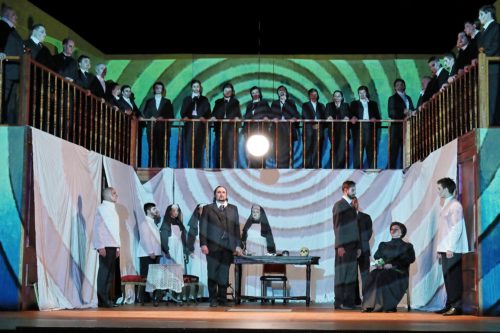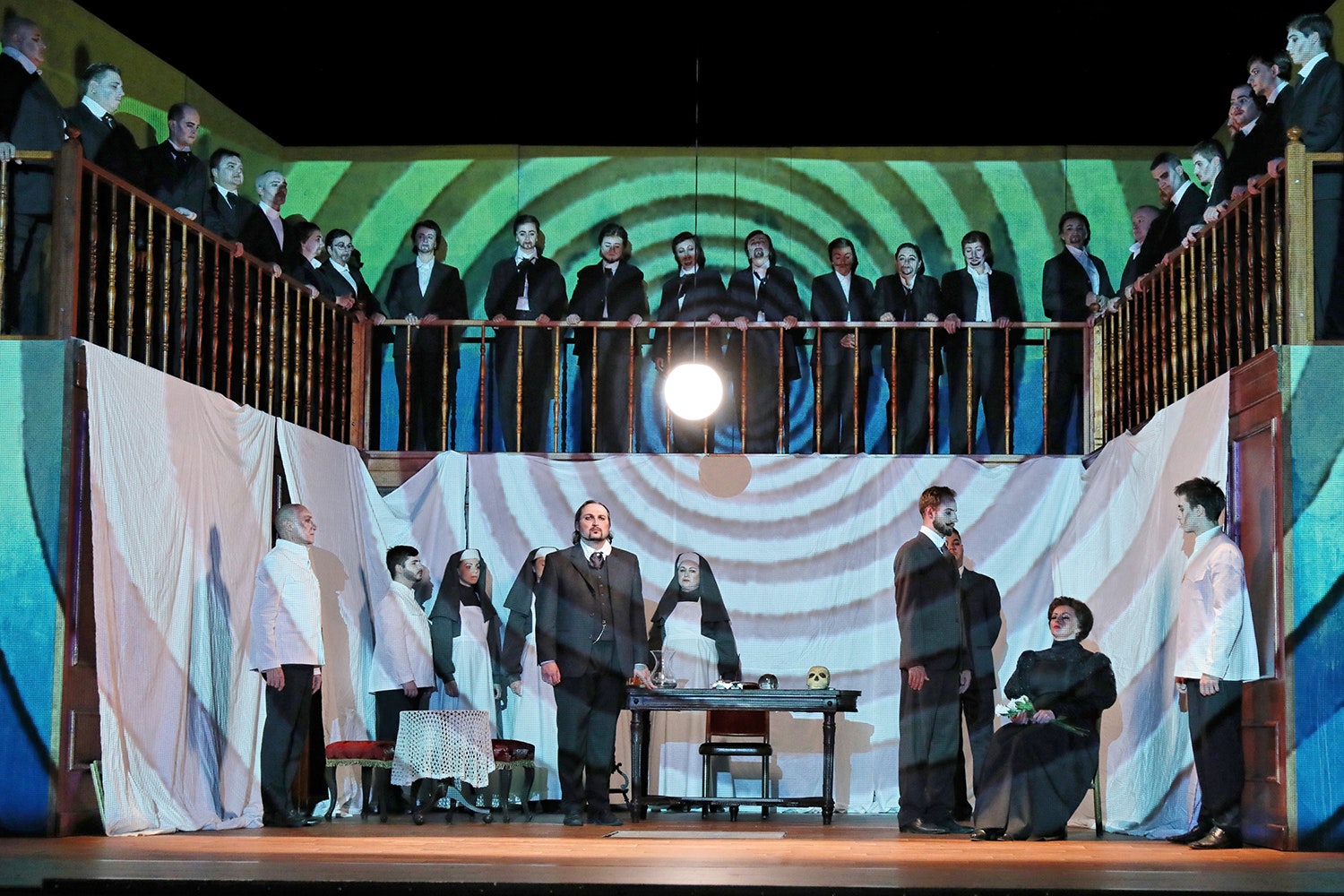 Czech Republic Weber, Der Freischütz: Soloists, Orchestra and Chorus of the Silesian Theater Opava / Vojtěch Spurný (conductor). Estates Theater Prague, 7.1.2020. (SS)
Czech Republic Weber, Der Freischütz: Soloists, Orchestra and Chorus of the Silesian Theater Opava / Vojtěch Spurný (conductor). Estates Theater Prague, 7.1.2020. (SS)

Production:
Director – Lubor Cukr
Sets and costumes – David Janošek
Cast:
Max – Jan Ondráček
Kaspar – Jiří Přibyl
Agathe – Barbora Řeřichová
Ännchen – Lucie Kaňková
Kilian – Tomasz Suchanek
Kuno – Zdeněk Kapl
Ottokar – Lukáš Zeman
Hermit – Josef Kovačič
Eagle – Samuel Klösel
Dove – Sofie Klöslová
Violist – Laura Zedníčková
The Silesian Theater Opava’s production of Weber’s Der Freischütz, shown at the Estates Theater on the fourth night of Prague’s Opera 2020 Music Theater Festival, begins with a film that shows Agathe being abused by her father and then pivots to Freud. As the overture concludes, a quotation from the father of psychoanalysis is projected onto the curtain: ‘A human being is seldom altogether good or bad; he is usually “good” in one relation and “bad” in another, or “good” in certain external circumstances and in others decidedly “bad”’.
Trauma and Freud are the key themes of Lubor Cukr’s production, which premiered in Opava last year. The curtain opens to the chorus enacting scenes of disorientation; a sea of frenzied lost souls ruled by their base instincts. The chorus’s slithering ballet of the id is quickly suppressed in the opening victory chorus: Max, revealed as one of their number, is bundled into a straitjacket and subjected to ECT before being packed off to Dr. Freud for his talking cure.
A wood-paneled drawing room is revealed and Max’s ‘Durch die Wälder’ is delivered from the famous couch. The implication, going by all the action that follows, is that Freud’s talking cure was about repressing urges and desires(?!), because Max and also Agathe become emotionally inhibited and socially awkward for the rest of the show – while Kaspar takes on the form of their repressed id whom they must resist (he’s even presented as a double of Max, just as Ännchen is a double of Agathe). All the Personenregie becomes uptight and Victorian, and frankly a little boring. Having doubles begins as an eye-catching trick, but any tension between them quickly fizzles out.
A few more striking images include the solo violist in Ännchen’s ode to marital bliss performing onstage dressed as a nun; two children with the heads of a dove and an eagle who roam the stage as wandering symbols, merging the opera’s animal victims with Max’s and Agathe’s repressed consciousness; and a throng of Agathe doubles who collectively menstruate during the shooting contest, which was inserted as another (clunky) metaphor but just looked like gratuitous period shaming. The supernatural elements were observed with a stage elevator reveal of Samiel, sporting black angel wings and surrounded by a diabolical circle of fire. The spoken dialogue was also disembodied from the speaking voices of the cast – pre-recorded by a first-rate clutch of German voice actors, this was played back with spooky reverb over the mute actions of the characters, adding another otherworldly note.
This production wasn’t short of ideas or images, but some were dubious and none of them cohered. Certain aspects, like the film of Agathe being abused by her father, came across as workshop material that was never developed or integrated into the concept, but got left in anyway. Unfortunately, the cast made a weak impression too.
Jan Ondráček was disappointing as Max: his smallish tenor had a covered quality and the singing was uneven with frequent intonation slips. Jiří Přibyl, who had sung Don Alfonso the previous night of the festival, appeared here as Kaspar. The singing was just as solid and his German diction as spotless as his Italian, but he was often out of sync with the pit. Lucie Kaňková’s Ännchen was an unlucky casualty of the director’s decision to make the character a double of Agathe, with the result that she blended into the background and was further sidelined in her aria, where she had to compete for attention with the viola nun. Lukáš Zeman as Ottokar and Josef Kovačič as the Hermit were both good, bringing decent vocal heft to these small but important roles. Otherwise, the main bright spot was Barbora Řeřichová, who sang Agathe with the same impressive vocal control and presence she brought to Fiordiligi the previous night, and had plenty of breath for her long phrases.
Vojtěch Spurný’s conducting wasn’t much more than adequate, and could have been a lot more assertive. A score that depicts the unleashing of demonic forces shouldn’t sound so meek and scrappy.
A Freudian Der Freischütz is an interesting idea in theory but was realized very ineffectively in this production and couldn’t be salvaged by the performances or conducting. As a concept, though, it does make you wonder what a director like Claus Guth would do with this idea.
Sebastian Smallshaw
